May 29, 2025 | 16:03 GMT +7
May 29, 2025 | 16:03 GMT +7
Hotline: 0913.378.918
May 29, 2025 | 16:03 GMT +7
Hotline: 0913.378.918
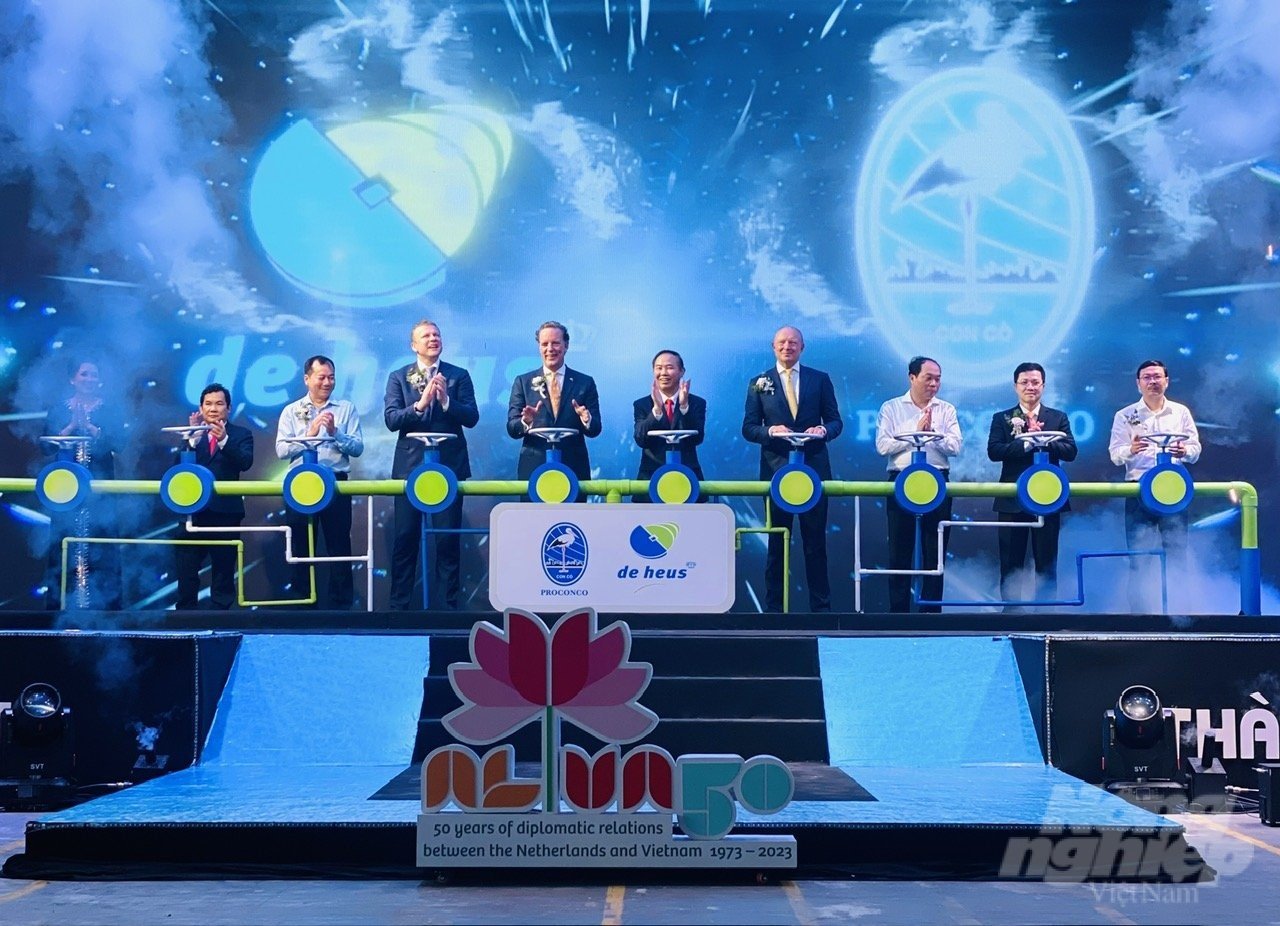
Deputy Minister of Agriculture and Rural Development Phung Duc Tien and De Heus leaders performed the inauguration ceremony of the Can Tho aquatic feed factory worth USD 18.6 million. Photo: Le Hoang Vu.
This is De Heus's 10th factory in Vietnam and the first factory specializing in producing feed for pangasius fish. The factory has an investment capital of USD 18.6 million, a design capacity of up to 240,000 tons/year, and is equipped with modern technological lines from Europe and America, ensuring the highest quality standards according to ISO 22000, Bap, and GlobalGAP certifications.
The inauguration ceremony was attended by many high-ranking officials from Vietnam and the Netherlands, along with more than 600 customers, partners, and the press. This is also one of the events marking 50 years of diplomatic relations between the two countries.
Mr. Daniel Stork, Consul General of the Kingdom of the Netherlands in Ho Chi Minh City, said that the De Heus Can Tho factory contributes to implementing the United Nations' sustainable development goals, especially goals related to food security, improving nutrition, and promoting sustainable agriculture.
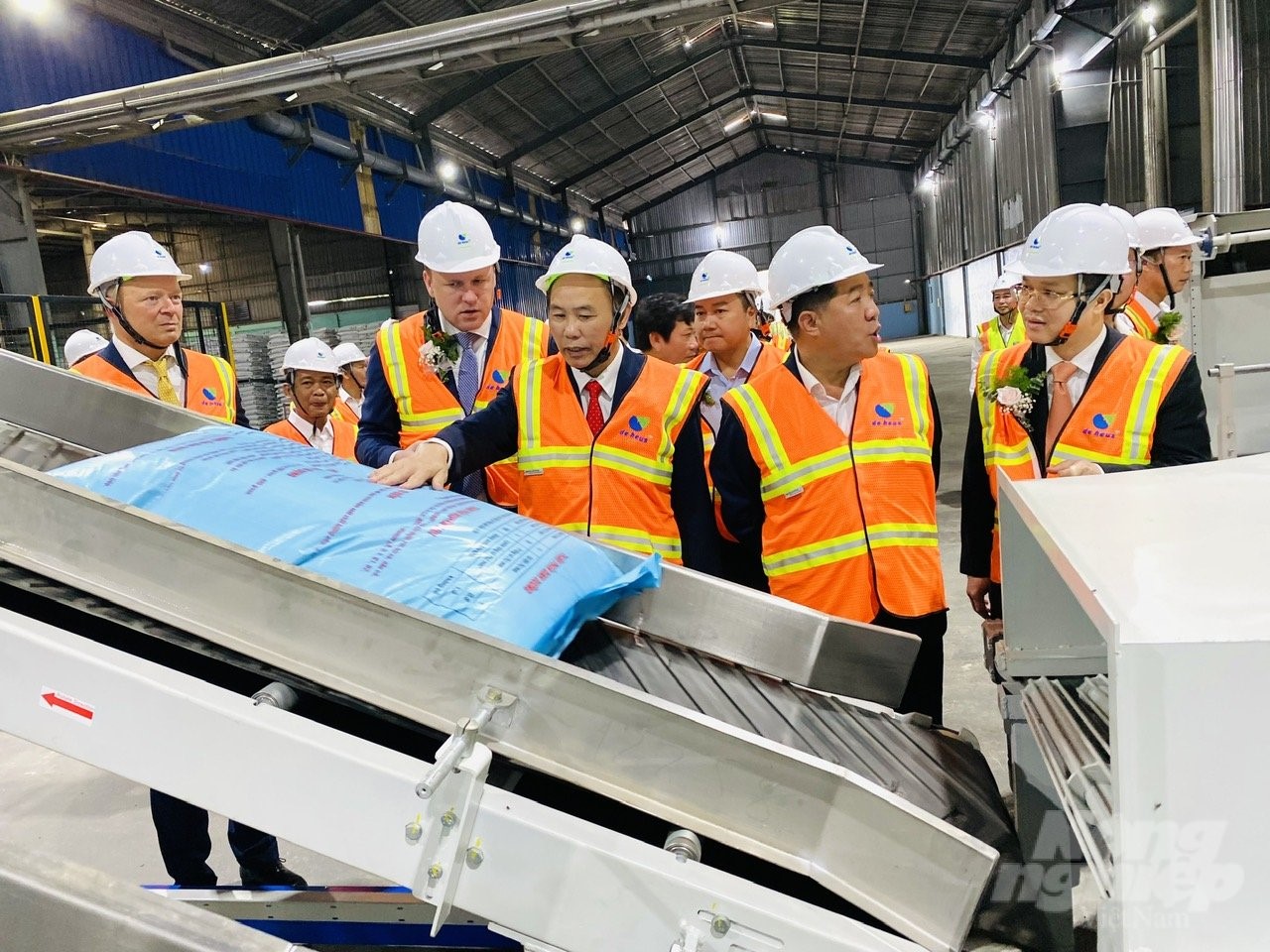
This is De Heus's 10th factory in Vietnam and the first factory specializing in producing feed for pangasius fish. Photo: Le Hoang Vu.
Mr. Koen De Heus, General Director of Royal De Heus Group, said that De Heus believes in the potential of whitefish as a highly nutritious, delicious, and sustainable source of protein. De Heus is committed to continuing to develop its strategic position in Vietnam with domestic and foreign partners to support pangasius farmers in the Mekong Delta region.
Mr. Johan van den Ban, General Director of De Heus Vietnam, also shared about De Heus's breakthrough nutritional solutions and deep understanding of domestic and international markets. In addition, De Heus also plays a coordinating role in the value chain by supporting farmers in accessing top-quality genetic solutions and technical and financial resource management solutions, as well as connecting them with the consumption market.
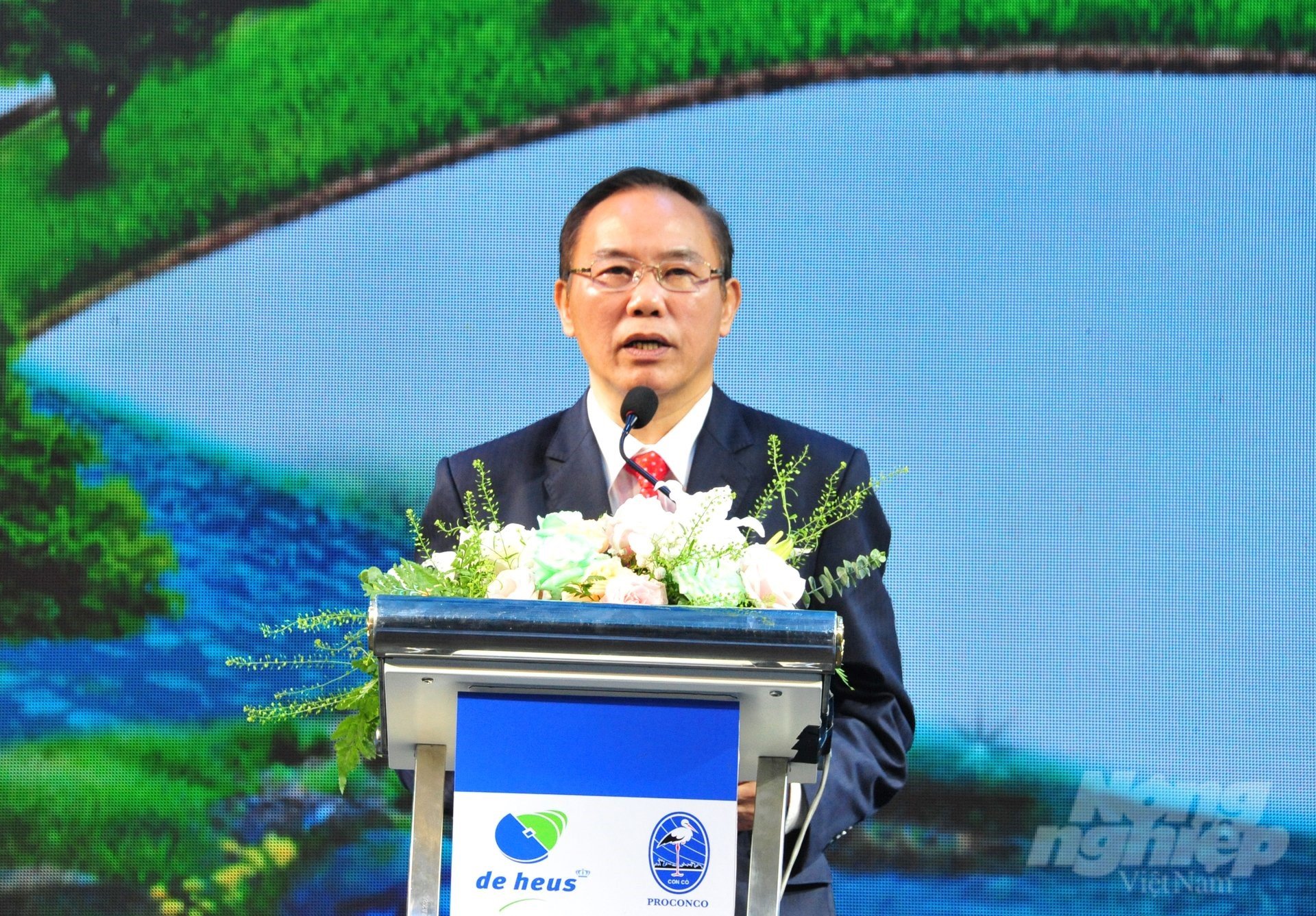
Mr. Phung Duc Tien, Deputy Minister of Agriculture and Rural Development, gave a directive speech at the inauguration ceremony of De Heus' pangasius feed factory. Photo: Le Hoang Vu.
The De Heus Can Tho factory has a convenient location right at the river port, which helps to effectively transport raw materials into the factory and finished products to aquaculture farmers.
De Heus and partner companies have applied the model of transporting aquatic feed in bulk cargo by waterway, helping to save costs, minimize greenhouse gas emissions, eliminate plastic packaging, and reduce losses during transportation and production.
De Heus is also implementing a solar rooftop project with a capacity of up to 20 MWp at the entire factory and farm system. This is the largest solar rooftop project in Vietnam in 2023 and is expected to be completed in 2024. This project will contribute to reducing electricity consumption from the national power source and increasing the use of sustainable renewable energy.
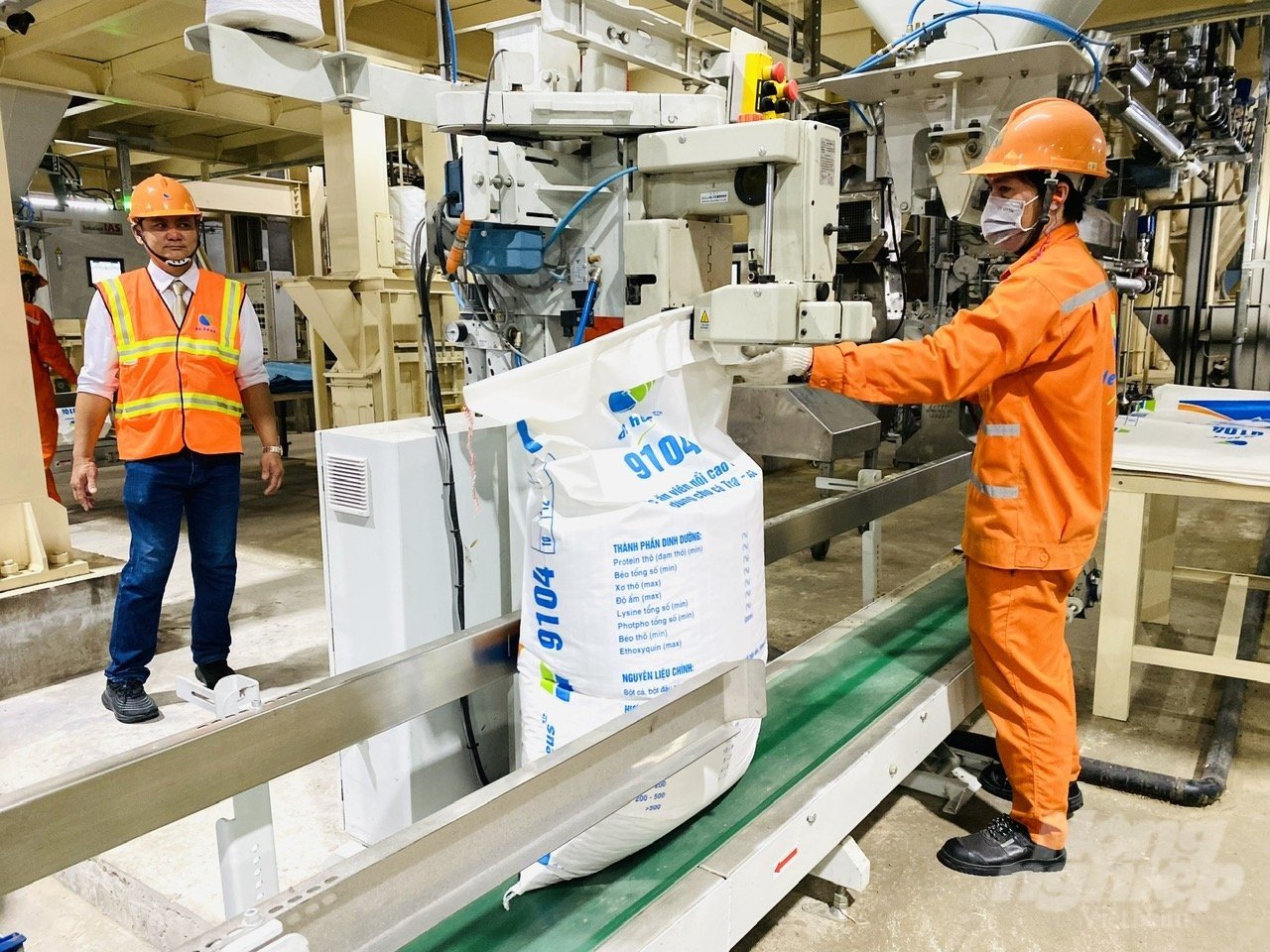
The production line of the De Heus Can Tho factory is standardized with modern technology from Europe and America, ensuring the highest quality standards according to ISO 22000, Bap, and GlobalGAP certifications. Photo: Le Hoang Vu.
All of these efforts are aimed at building an efficient, sustainable pangasius industry that can adapt to climate change and especially protect the environment while still having enough competitiveness and meeting the requirements of international markets.
Deputy Minister Phung Duc Tien said that input materials for aquaculture currently account for the majority of costs in intensive aquaculture, of which the cost of aquatic feed accounts for 64-67%. Therefore, the quality and price management of aquatic feed are always of concern in policy development and practical implementation.
The demand for raw materials to produce animal feed and aquatic feed is estimated at 31.2 million tons/year, of which the need for raw materials for aquatic feed is estimated at about 6 million tons/year. Only about 35% of domestically produced raw materials are supplied, while the remaining 65% are imported.
According to the Deputy Minister, in recent times, due to the COVID-19 pandemic and the Russia-Ukraine conflict, the price of raw materials for producing animal feed and aquatic feed has continuously increased, causing the price of aquatic feed to increase.
Raw materials for aquatic feed production still depend mainly on imports. Domestic raw materials from by-products of the seafood processing industry, such as fish, shrimp, etc., are used in simple technologies such as drying, grinding, etc., with very limited output.
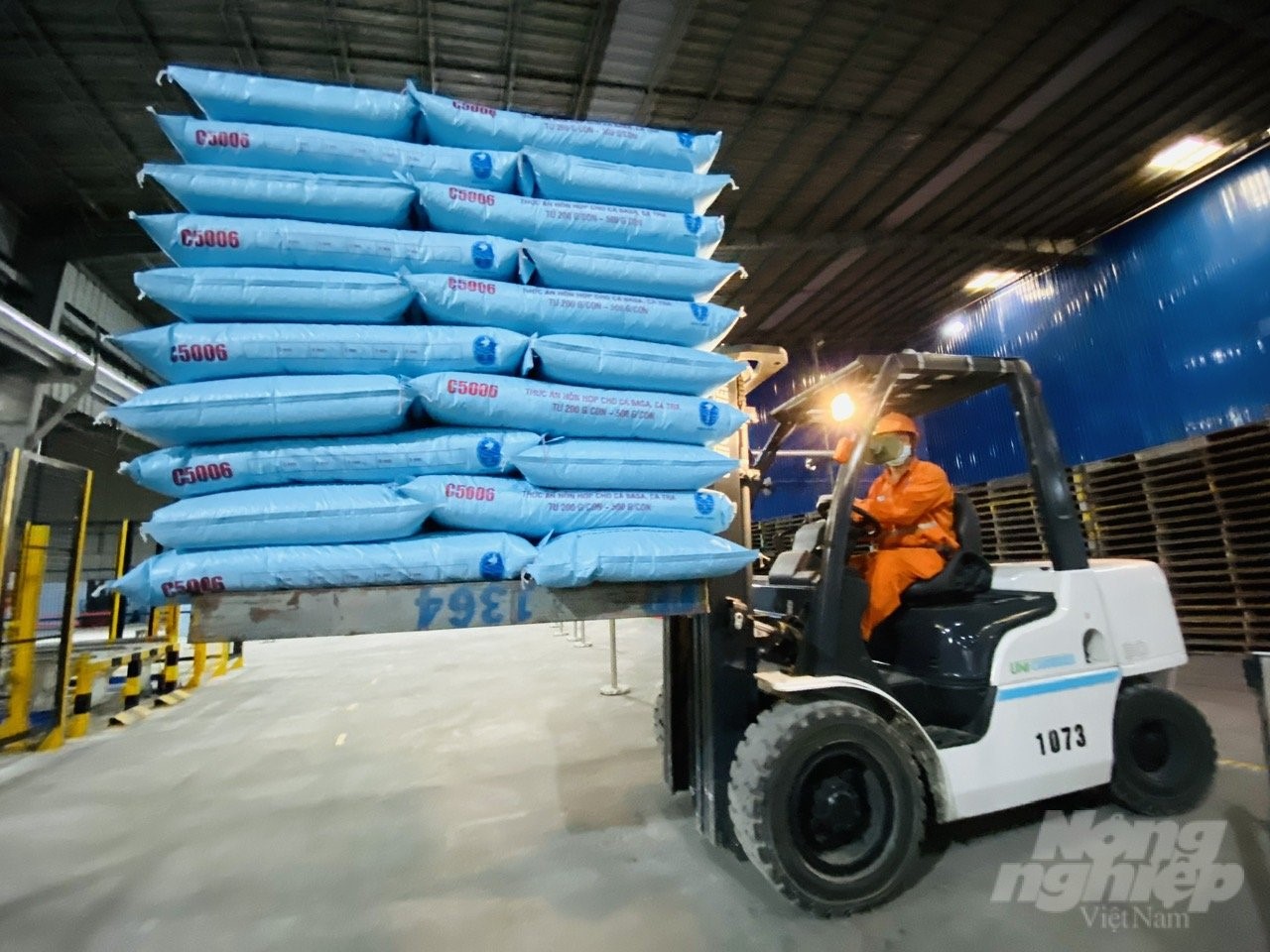
The De Heus Can Tho factory has a convenient location right at the river port, which helps to effectively transport raw materials into the factory and finished products to aquaculture farmers. Photo: Le Hoang Vu.
Regarding solutions, Deputy Minister Phung Duc Tien said that it is necessary to have policies to encourage and support the development of domestic raw materials to replace imported raw materials. Call on businesses to apply new technology to increase nutritional value and replace expensive raw materials in aquatic feed production, such as fermentation technology in soybean meal fermentation. Recover and use microbial biomass in food production (microbial biomass in MSG production)
Use heating technology to process easily digestible soybean meal in aquatic feed. Apply digital technology, automation technology, and biotechnology to increase productivity, reduce prices, and improve product quality. Aquatic feed manufacturing businesses have been constantly improving their production processes.
At the same time, it is necessary to optimize production formulas, use alternative raw materials, and apply quality control systems to produce quality products with reasonable prices to help farmers earn a profit.
Translated by Huyen Vu Thu

(VAN) FAO’s Director-General addresses the 5th Baghdad International Water Conference.
/2025/05/26/1716-4-nongnghiep-191706.jpg)
(VAN) Chain linkages, technological innovation, and raw material zoning are three strategic pillars for the coconut industry to strongly develop and elevate its position on the global agricultural map.
![Advanced mariculture – an inevitable trend: [4] Accompanied by scientists](https://t.ex-cdn.com/nongnghiepmoitruong.vn/608w/files/sohk/2025/05/13/1941-pgsts-vo-van-nha-140958_717.jpg)
(VAN) According to Assoc. Prof. Dr. Vo Van Nha, Director of the RIA III, the development of advanced offshore mariculture is no longer an option but an essential path for Vietnam’s fisheries sector.

(VAN) Vietnam is intensifying the development of mollusk farming areas that meet international standards, aiming for sustainable growth and enhancing its export position in the global seafood market.
![Advanced mariculture – an inevitable trend: [3] Policy-driven momentum](https://t.ex-cdn.com/nongnghiepmoitruong.vn/608w/files/doanhtq/2025/05/21/0104-0616-0348-nuoi-bien-170339_789.jpg)
(VAN) To ensure the success of offshore mariculture that uses advanced technologies, it is essential to establish supportive policies that inspire both individuals and enterprises to invest with confidence.
![Advanced mariculture – an inevitable trend: [2] Outstanding results](https://t.ex-cdn.com/nongnghiepmoitruong.vn/608w/files/sohk/2025/05/12/4632-4136-nuoi-bien-11-164117_819.jpg)
(VAN) Pilot models of high-tech offshore mariculture in Vietnam, particularly in the South Central Coast region, have demonstrated exceptional economic returns and sustainability, setting a new direction for the country’s aquaculture industry.
![Advanced mariculture – an inevitable trend: [1] Moving offshore](https://t.ex-cdn.com/nongnghiepmoitruong.vn/608w/files/phucpm/2025/05/18/0252-2436-nuoi-bien-6-162148_783.jpg)
(VAN) Mariculture using advanced technology and moving offshore is an inevitable trend, as nearshore areas increasingly reveal limitations.